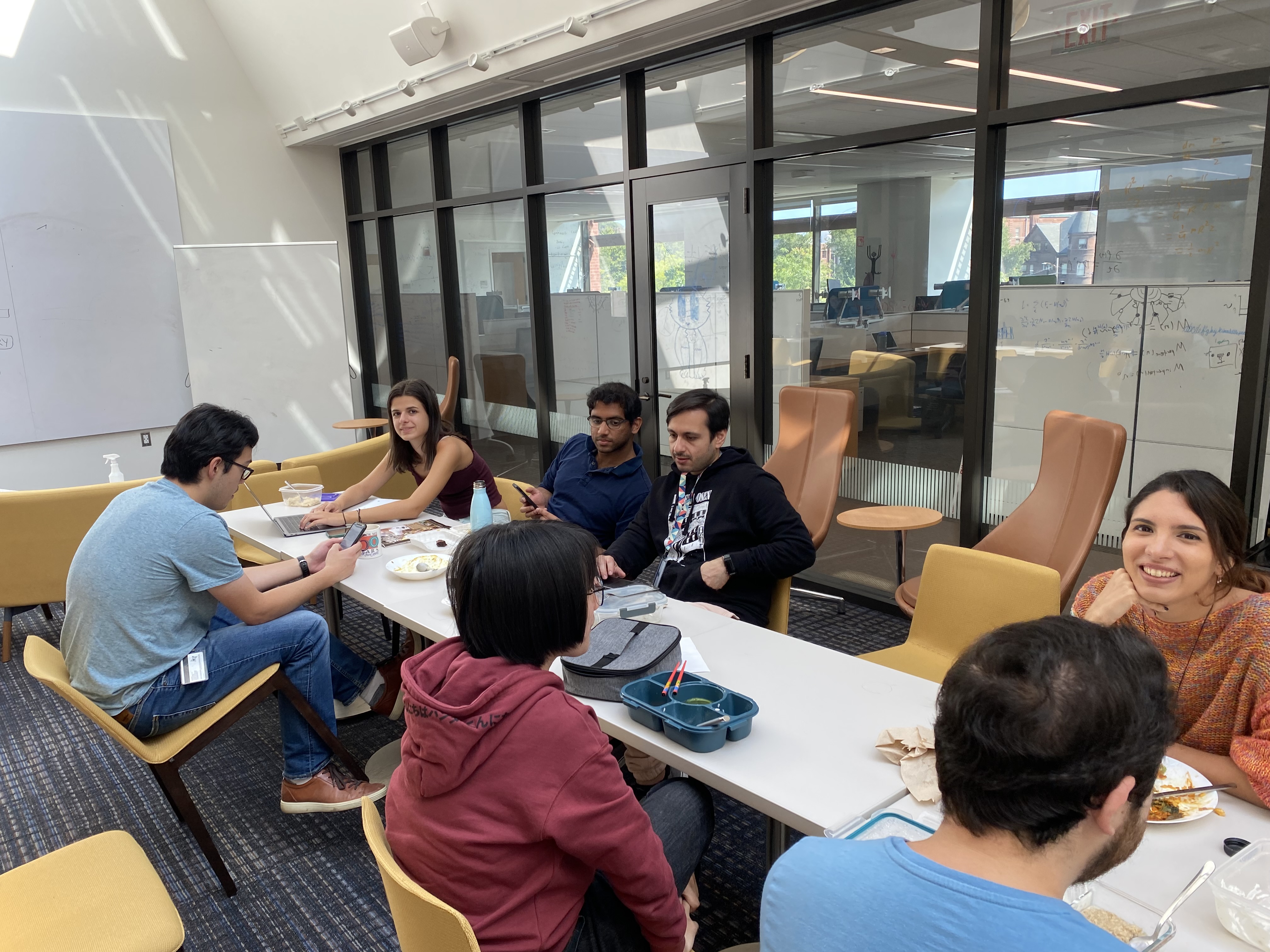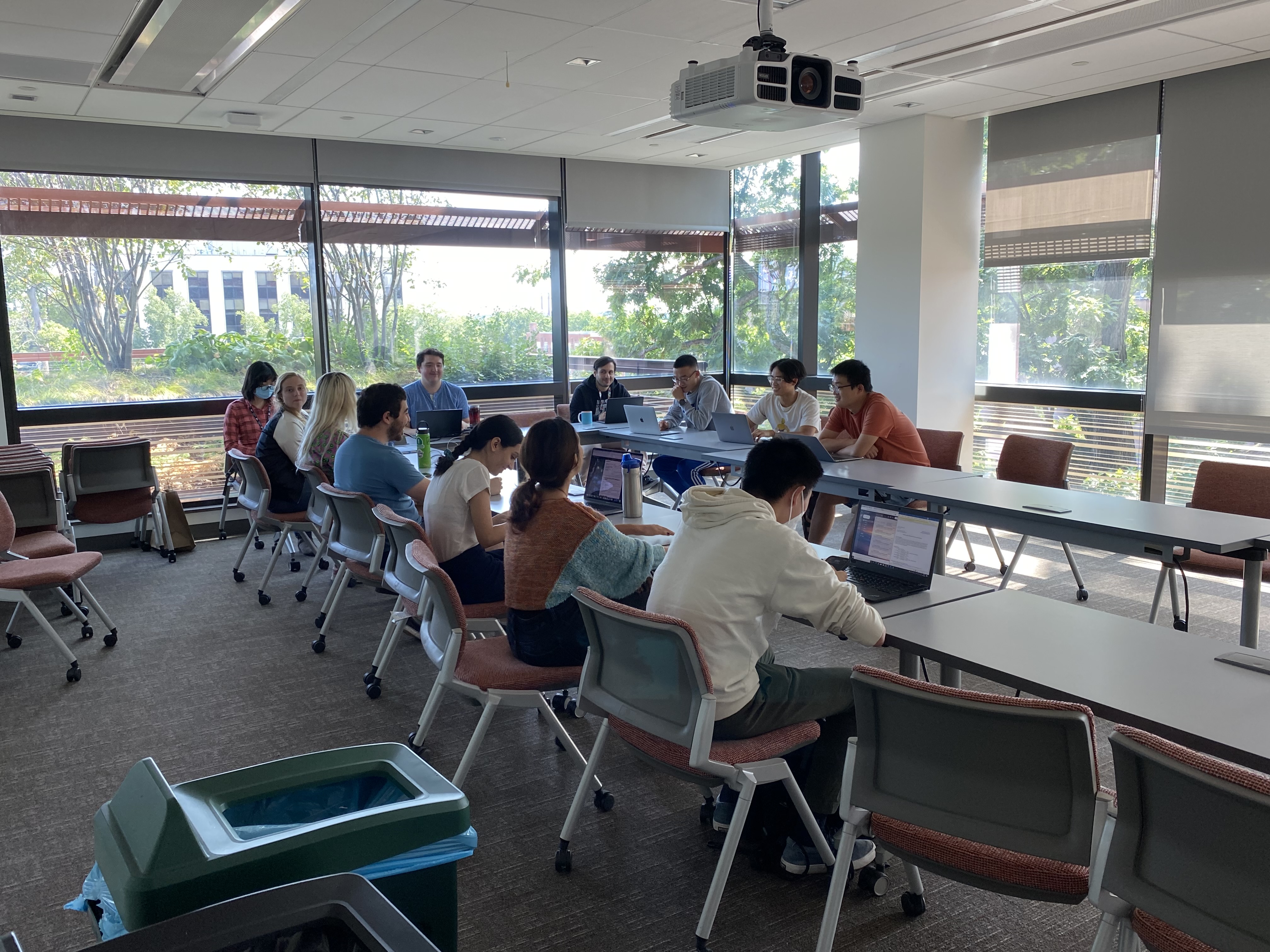
About the Quantitative Biology Institute
The Yale Quantitative Biology Institute, affectionately known as QBio, was founded by Provost Ben Polak in July 2017, with Damon Clark currently serving as Director. We thank the Yale administration, especially Dean Gendler and former Deputy Provost Steve Girvin, for making this exciting new enterprise possible. Follow us on Twitter (@QBioYale)!
The QBio is led by a Director, Damon Clark, Associate Professor of Molecular, Cellular & Developmental Biology, of Physics, and of Neuroscience. Governance and oversight are provided by an Advisory Committee, whose authority includes recommending faculty appointments to the Institute.
Contact the Qantitative Biology Institute at: qbio@yale.edu
Research
Location and Facilities | Laboratory Space | Positioning of QBI within the sciences at Yale
The Quantitative Biology Institute is situated on the concourse and plaza levels of the new Yale Sciences Building. This is an ideal location for interdisciplinary, interdepartmental research and teaching. It is adjacent to the advanced lightand electron microscope imaging facilities, and in close proximity to the three basic biology departments, and to the physics chemistry, engineering, computer sciences, mathematics, statistics and data science departments. The proximity of the Yale Science Building to the new colleges will make Quantitative Biology directly accessible to undergraduate students, satisfying an increasing demand for integrated education in the biological and physical sciences.

The Quantitative Biology Institute comprises twelve laboratories - seven “wet” and five “dry”. The lab space will be “open” in the sense that working and seating space for students and postdocs from different groups will be mixed together. A key design feature is that the theoretical and computational groups will have access to the wet labs, so they can incorporate experiments into their research programs.
A central common lounge area under the skylight will facilitate informal discussions. Additional open office space will house first-year graduate students, collaborators from across Yale’s three campuses, and outside visitors to the Institute.

Positioning of QBI within the sciences at Yale
Yale University is committed to excellence in scientific research. President Salovey recently charged the University Science Strategy Committee (USSC) to identify the most promising opportunities for investment across scientific disciplines. The committee recently released its report (here).
QBio is well positioned with respect to several of the recommended priorities areas. QBI’s mission is to bring theory and computation into a broad range basic biological research areas from molecules through cells and tissues (including the brain) to ecosystems. QBio is implementing its mission through joint appointments of QBio faculty with physical, mathematical and engineering departments.
A crucial goal of the Quantitative Biology Institute is to train of a new generation of undergraduate and graduate biology students with the theoretical and mathematical tools necessary to formulate physical mathematical models, to analyze huge data sets, and to test hypotheses by comparison to experimental measurements. At the same time, we need to educate undergraduate students, graduate students and postdocs from the mathematical and physical sciences in the biological sciences.
The Quantitative Biology Institute will play a major role in reshaping programs of study for
undergraduate students in both the biological and the mathematical sciences. Some revision along these
lines is already underway in the biology departments, with the introduction of three recent courses
(spearheaded by Thierry Emonet). These start from introductory dynamical systems and MATLAB programming
and proceed to more advanced lecture and seminar courses on applications of dynamical systems theory to
cell biology, developmental biology and neurobiology. The courses form the basis for a Quantitative
Biology Track in MCDB and a Computational Biology Concentration in MBB. Faculty from MCDB, MB&B and
Bioengineering teach these courses, which serve a diverse student body from different majors including
applied mathematics, chemistry, computer science, EEB, engineering, MB&B, MCDB, and physics.
Sometimes the quantitative biology courses are taken together with introductory courses from Computer
Science (on more basic programming techniques), Mathematics (linear algebra) and Statistics and Data
Sciences (on basic probability and statistics). However, these programs are not fully integrated, and
the next generation of biomedical researchers needs to be equipped with an enlarged toolbox of
quantitative techniques such as machine learning and AI. A complementary goal is to provide a path for
mathematics/applied mathematics/computer science undergraduates to be integrated into biology. Achieving
these goals will require a high degree of communication and coordination between the biology departments
and the mathematical, physics and engineering departments; the QBio can facilitate this process because
its faculty will have primary appointments in several different departments.
The QBI will tackle a wide range of biological problems involving the emergence of structure and function. Current questions addressed by QBI faculty include the maintenance of phenotypic diversity in populations (Thierry), the eluciation of 3D structure from electron microscope projections (Lederman), branching morphogenesis (Howard), cellular packing in bacterial communities (Jing), and the neuronal computation in the visual system (Clark).
The QBio will work closely with the Physical and Engineering Biology (PEB) and the Computational Biology and Bioinformatics (CBB) graduate programs to provide interdisciplinary training to graduate students from the physical and biological sciences. An important goal is to increase the numbers of graduate students with undergraduate backgrounds in mathematics, statistics, data and computer sciences who work on biological questions. The QBio will provide space for PEB students in their first year, before they join labs. In addition to coursework oriented training PEB organizes a seminar series.
The QBio also benefits from the recent formation of a new graduate track—Biochemistry, Quantitative Biology, Biophysics & Structural Biology (BQBS) —within the BBS program. Faculty in the QBio will play key teaching roles in this track, including providing advanced courses in modern mathematical approaches in biology such as machine learning and AI.
QBio faculty will provide training to the Yale quantitative biology community through organization of workshops on advanced techniques such as microscopy, image analysis, numerical simulations, data analysis, machine learning, particle tracking, optogenetics, optical tweezers etc.
Many QBio members participate in diversity and inclusion in K-12, undergraduate, and graduate STEM education efforts through their involvement in programs such as Exploring Science/Yale Open Labs, the Society for the Advancement of Chicanos/Hispanics and Native Americans in Science (SACNAS), the Yale BBS Diversity and Inclusion Collective (YBDIC), the Yale Physical and Engineering Biology (PEB) summer program, Yale National Initiative, and the STEM Program Evaluation and Research Lab.
QBio will provide “hotel”-style desk space for faculty, students and visitors from throughout Yale University, and beyond, for collaborations with QBio groups.

